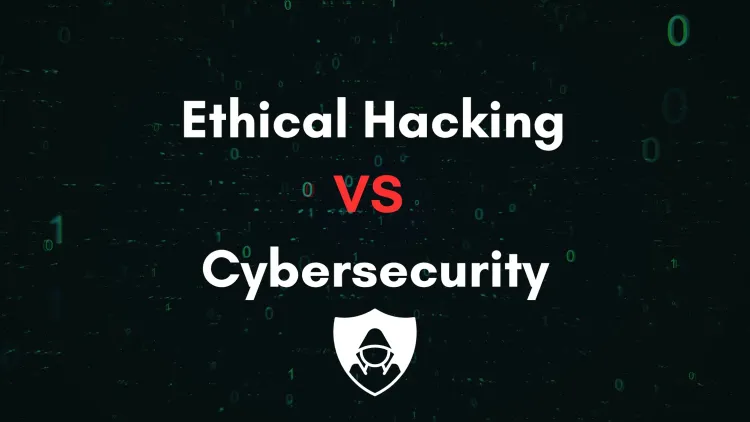Difference Between Cybersecurity and Ethical Hacking

Difference between cybersecurity and ethical hacking is a common question for beginners stepping into the digital defense world. While these two fields overlap in purpose—protecting data and systems—they serve different roles, require different skill sets, and offer distinct career paths.
If you’re planning to enter this domain, understanding the difference between cybersecurity and ethical hacking will help you choose the right career path and training. One great place to start is the CyberShield Mastery Course, designed for learners aiming to build strong, real-world skills in both fields.
What Is Cybersecurity?
Cybersecurity is the broad practice of protecting systems, networks, and data from cyber threats. It’s an umbrella term that includes prevention, detection, and response strategies.
Cybersecurity professionals work on:
- Securing IT infrastructure
- Developing security policies
- Implementing firewalls and antivirus solutions
- Monitoring for threats and vulnerabilities
- Responding to cyberattacks
To explore key tools and roles, visit Cybersecurity Jobs You Can Get in India.
What Is Ethical Hacking?
Ethical hacking is a specialized area within cybersecurity focused on offense. Ethical hackers—also known as white-hat hackers—simulate cyberattacks to test system defenses.
Their responsibilities include:
- Penetration testing
- Vulnerability assessment
- Exploiting weaknesses (legally)
- Reporting and patching flaws
- Enhancing system security postures
Learn how to get started in How to Become an Ethical Hacker.
Key Differences Between Cybersecurity and Ethical Hacking
| Category | Cybersecurity | Ethical Hacking |
|---|---|---|
| Scope | Defensive, broad in nature | Offensive, narrow and specialized |
| Goal | Prevent attacks and secure systems | Identify vulnerabilities through testing |
| Approach | Policy, monitoring, and compliance | Real-time exploitation and testing |
| Tools Used | Firewalls, SIEM, Antivirus | Kali Linux, Metasploit, Burp Suite |
| Mindset | Protection and prevention | Think like a hacker (offensive) |
| Career Roles | SOC Analyst, Security Architect | Penetration Tester, Bug Bounty Hunter |
Learning Paths: Which One to Choose?
Understanding the difference between cybersecurity and ethical hacking helps you plan your learning path.
Choose cybersecurity if:
- You want to work in monitoring, compliance, or cloud security
- You enjoy strategy, defense, and policy design
- You prefer broader career options in enterprise environments
Choose ethical hacking if:
- You love solving puzzles and thinking like attackers
- You want to specialize in penetration testing
- You’re curious about real-world exploits and systems
Explore both in the CyberShield Mastery Course, which includes modules for beginners in both fields.
Skills Comparison
Cybersecurity Skills:
- Network security
- Risk assessment
- Security compliance
- Cloud protection
- SIEM and log analysis
Ethical Hacking Skills:
- Vulnerability scanning
- Exploit development
- Scripting (Python, Bash)
- Kali Linux proficiency
- Social engineering tactics
Both roles benefit from understanding Cybersecurity Tools You Should Learn.
Career Opportunities and Salaries
In India, both fields offer high-paying, fast-growing roles.
Cybersecurity Careers:
- Security Analyst (₹4–7 LPA)
- SOC Analyst (₹5–8 LPA)
- Cloud Security Engineer (₹10–20 LPA)
Ethical Hacking Careers:
- Penetration Tester (₹6–15 LPA)
- Red Team Specialist (₹12–25 LPA)
- Bug Bounty Hunter (earn per vulnerability reported)
Know more in Is Cybersecurity a Good Career in India?.


 Subscription
Subscription Performance Subscription
Performance Subscription Premium Subscription
Premium Subscription Base Subscription
Base Subscription Furniture
Furniture Bed
Bed Kitchen
Kitchen Almirah and Wardrobe
Almirah and Wardrobe LCD Cabinet
LCD Cabinet Verified Partner
Verified Partner Earn Money
Earn Money

 AI & Data Science
AI & Data Science Business & Startup
Business & Startup Cybersecurity & Cloud
Cybersecurity & Cloud E-commerce & Sales
E-commerce & Sales Marketing & Growth
Marketing & Growth Web/App Development
Web/App Development